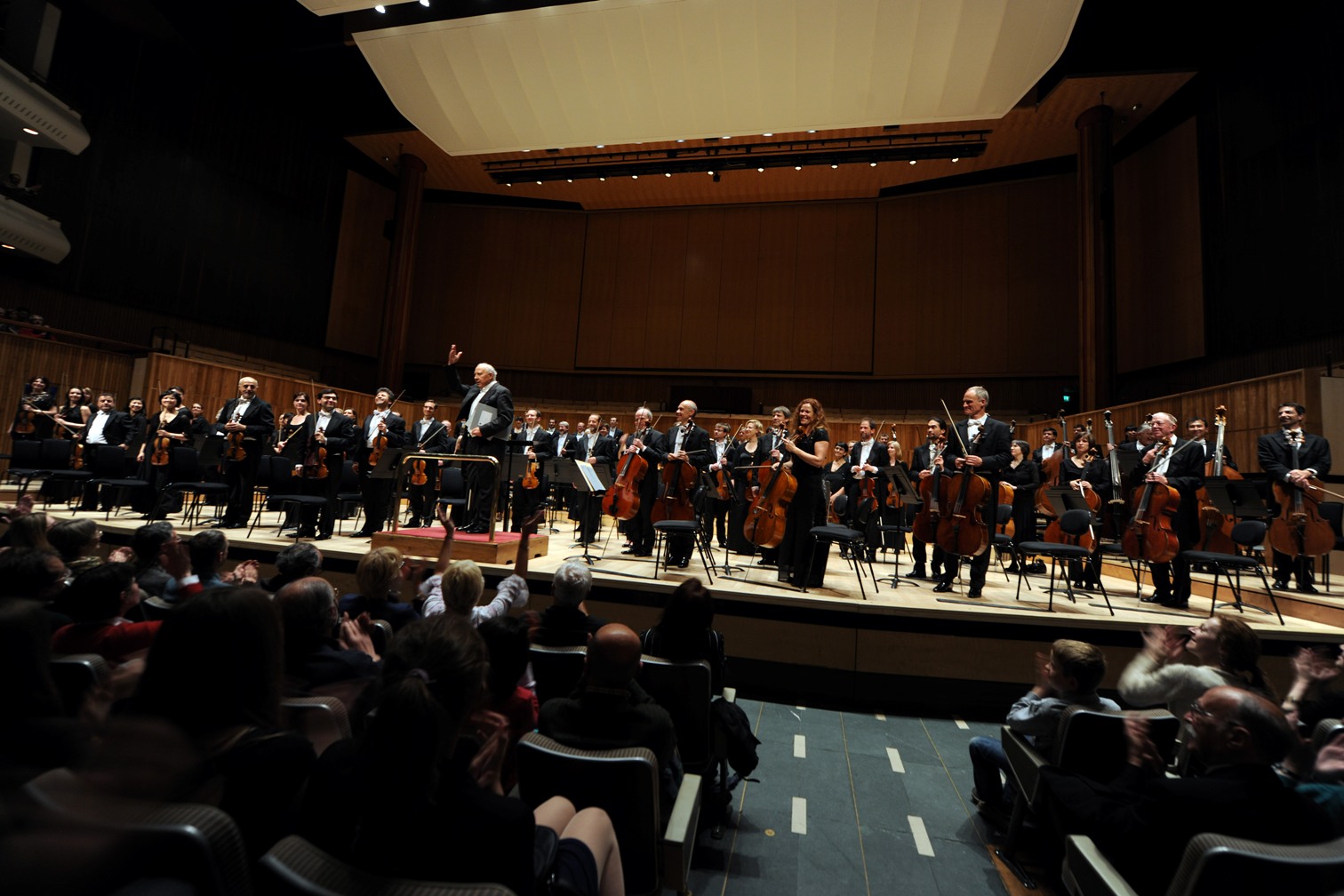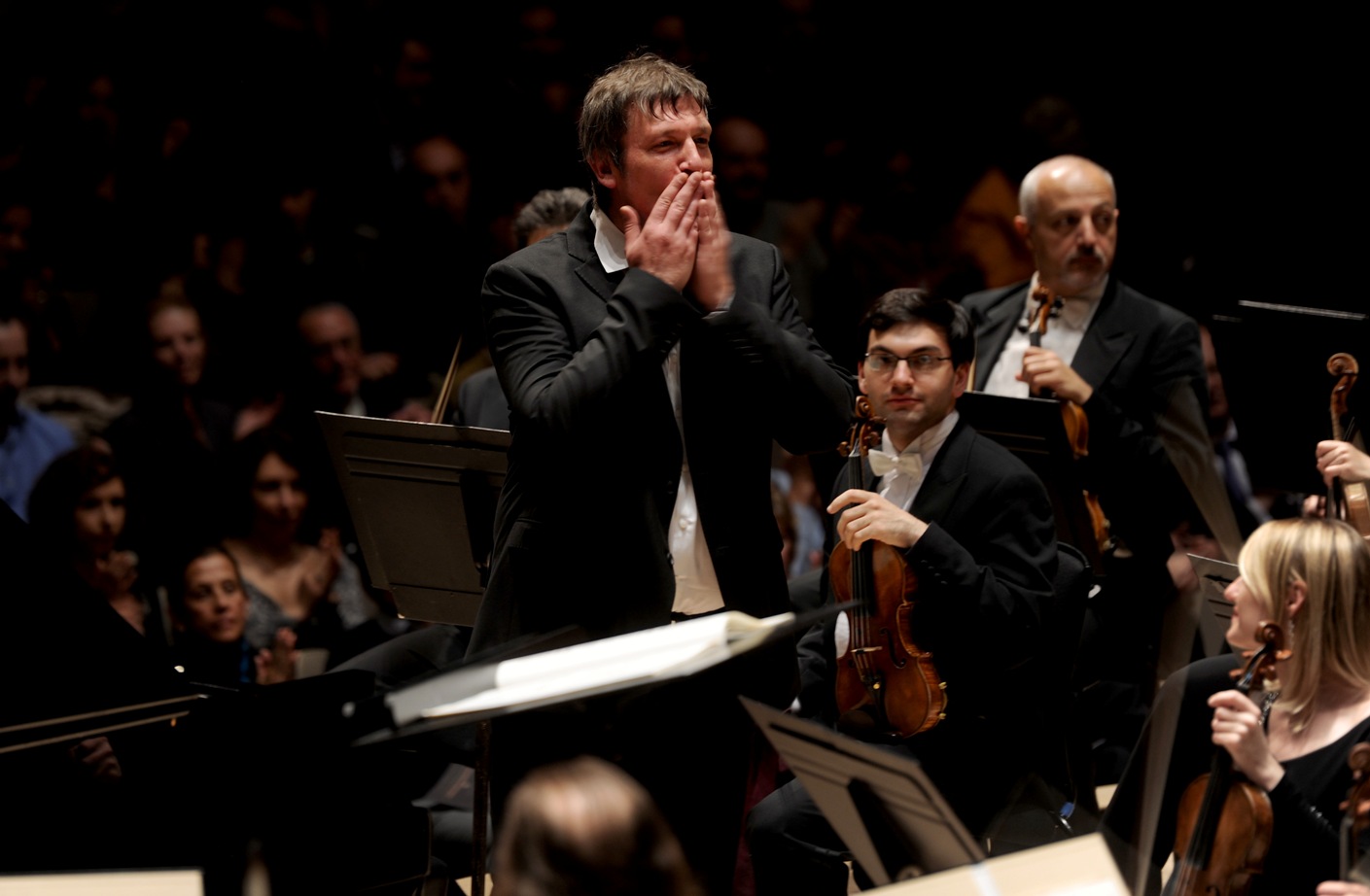Berezovsky, Orchestre de la Suisse Romande, Järvi, Royal Festival Hall | reviews, news & interviews
Berezovsky, Orchestre de la Suisse Romande, Järvi, Royal Festival Hall
Berezovsky, Orchestre de la Suisse Romande, Järvi, Royal Festival Hall
The great Estonian returns for classic interpretations with his Swiss orchestra
In 1980, an orchestra and conductor then hardly known in Britain came to the Royal Festival Hall. I went to hear Elisabeth Söderström in Strauss’s Four Last Songs; I left stunned by an unorthodox Sibelius Second Symphony and above all by one of the encores, Cantus to the Memory of Benjamin Britten by one Arvo Pärt.
It was an even cannier choice this time round. Pärt’s bell-punctuated, five-layered descending minor scales, coming slowly down to earth from high violins, reflect not only Britten’s mining of the simplest pattern in music but also the way the scale stalks Tchaikovsky’s Sixth, Pathétique, Symphony. That was the work in the second half of the Suisse Romande Orchestra’s visit, and the players could not have had a more assured guide through its peaks and troughs than Järvi. Already his work on the string sound can make it blossom in a matter of seconds; short- and long-term crescendi sent the soul soaring and, in the tragic final Adagio lamentoso, aching in sympathy.
 There was no sentimental lingering; at nearly 76, Järvi knows exactly where to apply the pressure points in the big melodies. If anything, the vast first movement was almost too professional at times; it took the long-term control of the graciously oddball (5/4) waltz’s rises and falls to bring the expected tears to the eyes. Freshly nuanced reprises and a daring slowdown for the return of the brash third-movement march were typical Järvi touches; but there was no messing with the ultimate dark night of the soul, its central hymn granted the long term vision which only the greatest of conductors can command.
There was no sentimental lingering; at nearly 76, Järvi knows exactly where to apply the pressure points in the big melodies. If anything, the vast first movement was almost too professional at times; it took the long-term control of the graciously oddball (5/4) waltz’s rises and falls to bring the expected tears to the eyes. Freshly nuanced reprises and a daring slowdown for the return of the brash third-movement march were typical Järvi touches; but there was no messing with the ultimate dark night of the soul, its central hymn granted the long term vision which only the greatest of conductors can command.
The Suisse Romande brass (last night's team pictured above by Jas Sansi) – bright but not quite perfect in ensemble - still need streamlining, and not all the orchestra's woodwind are real characters. First flute and horn, though, certainly are, and they made their mark in the Grieg Piano Concerto almost as much as the ever-surprising Boris Berezovsky, in true partnership with Järvi. Theirs was a fresh take not quite of this world, and decidedly out of it when Grieg pulls his last, and finest, melody out of the bag in the finale. Odd, then, that Berezovsky (pictured below by Sansi) and Järvi encored the slow movement, which seems to me in search of a tune like that; I was expecting the maverick pianist to play one of Grieg’s Lyric Pieces, or his celebrated Medtner. But it’s unfair to carp when he had tackled a showpiece with the lightest of touches and the subtlest of rubato, both perfectly matched by his conductor.
 As for Pärt official and unofficial, a bell began and ended the evening. You expect his Silhouette (Hommage à Gustave Eiffel) for strings and percussion, composed in 2009 for Neeme’s son Paavo taking up his post as the head of the Orchestre de Paris, to essay the same minimal drift as the Cantus, composed over three decades earlier. But soon pizzicato strings kick off a valse lente with a dark undertow that never quite becomes an explicit threat. Pärt's Britten tribute – I’m sure Järvi had a second encore up his sleeve, but a slightly stuffy audience didn’t clamour enough for more – had the same mesmerizing impact as in 1980, decisively signing off as it came to rest on the authoritative low A of the Suisse Romande’s nine double basses.
As for Pärt official and unofficial, a bell began and ended the evening. You expect his Silhouette (Hommage à Gustave Eiffel) for strings and percussion, composed in 2009 for Neeme’s son Paavo taking up his post as the head of the Orchestre de Paris, to essay the same minimal drift as the Cantus, composed over three decades earlier. But soon pizzicato strings kick off a valse lente with a dark undertow that never quite becomes an explicit threat. Pärt's Britten tribute – I’m sure Järvi had a second encore up his sleeve, but a slightly stuffy audience didn’t clamour enough for more – had the same mesmerizing impact as in 1980, decisively signing off as it came to rest on the authoritative low A of the Suisse Romande’s nine double basses.
- Details of the Orchestre de la Suisse Romande's 2013-14 season on the orchestra's website
- More about Neeme Järvi in 2008 on David Nice's blog, I'll Think of Something Later
rating
Share this article
The future of Arts Journalism
You can stop theartsdesk.com closing!
We urgently need financing to survive. Our fundraising drive has thus far raised £49,000 but we need to reach £100,000 or we will be forced to close. Please contribute here: https://gofund.me/c3f6033d
And if you can forward this information to anyone who might assist, we’d be grateful.

Subscribe to theartsdesk.com
Thank you for continuing to read our work on theartsdesk.com. For unlimited access to every article in its entirety, including our archive of more than 15,000 pieces, we're asking for £5 per month or £40 per year. We feel it's a very good deal, and hope you do too.
To take a subscription now simply click here.
And if you're looking for that extra gift for a friend or family member, why not treat them to a theartsdesk.com gift subscription?
more Classical music
 Willis-Sørensen, Ukrainian Freedom Orchestra, Wilson, Cadogan Hall review - romantic resilience
Passion, and polish, from Kyiv's musical warriors
Willis-Sørensen, Ukrainian Freedom Orchestra, Wilson, Cadogan Hall review - romantic resilience
Passion, and polish, from Kyiv's musical warriors
 BBC Proms: The Marriage of Figaro, Glyndebourne Festival review - merriment and menace
Strong Proms transfer for a robust and affecting show
BBC Proms: The Marriage of Figaro, Glyndebourne Festival review - merriment and menace
Strong Proms transfer for a robust and affecting show
 BBC Proms: Faust, Gewandhausorchester Leipzig, Nelsons review - grace, then grandeur
A great fiddler lightens a dense orchestral palette
BBC Proms: Faust, Gewandhausorchester Leipzig, Nelsons review - grace, then grandeur
A great fiddler lightens a dense orchestral palette
 BBC Proms: Jansen, Royal Concertgebouw Orchestra, Mäkelä review - confirming a phenomenon
Second Prom of a great orchestra and chief conductor in waiting never puts a foot wrong
BBC Proms: Jansen, Royal Concertgebouw Orchestra, Mäkelä review - confirming a phenomenon
Second Prom of a great orchestra and chief conductor in waiting never puts a foot wrong
 BBC Proms: Royal Concertgebouw Orchestra, Mäkelä review - defiantly introverted Mahler 5 gives food for thought
Chief Conductor in Waiting has supple, nuanced chemistry with a great orchestra
BBC Proms: Royal Concertgebouw Orchestra, Mäkelä review - defiantly introverted Mahler 5 gives food for thought
Chief Conductor in Waiting has supple, nuanced chemistry with a great orchestra
 Dunedin Consort, Butt / D’Angelo, Muñoz, Edinburgh International Festival 2025 review - tedious Handel, directionless song recital
Ho-hum 'comic' cantata, and a song recital needing more than a beautiful voice
Dunedin Consort, Butt / D’Angelo, Muñoz, Edinburgh International Festival 2025 review - tedious Handel, directionless song recital
Ho-hum 'comic' cantata, and a song recital needing more than a beautiful voice
 Classical CDs: Dungeons, microtones and psychic distress
This year's big anniversary celebrated with a pair of boxes, plus clarinets, pianos and sacred music
Classical CDs: Dungeons, microtones and psychic distress
This year's big anniversary celebrated with a pair of boxes, plus clarinets, pianos and sacred music
 BBC Proms: Liu, Philharmonia, Rouvali review - fine-tuned Tchaikovsky epic
Sounds perfectly finessed in a colourful cornucopia
BBC Proms: Liu, Philharmonia, Rouvali review - fine-tuned Tchaikovsky epic
Sounds perfectly finessed in a colourful cornucopia
 BBC Proms: Suor Angelica, LSO, Pappano review - earthly passion, heavenly grief
A Sister to remember blesses Puccini's convent tragedy
BBC Proms: Suor Angelica, LSO, Pappano review - earthly passion, heavenly grief
A Sister to remember blesses Puccini's convent tragedy
 BBC Proms: A Mass of Life, BBCSO, Elder review - a subtle guide to Delius's Nietzschean masterpiece
Mark Elder held back from blasting the audience with a wall of sound
BBC Proms: A Mass of Life, BBCSO, Elder review - a subtle guide to Delius's Nietzschean masterpiece
Mark Elder held back from blasting the audience with a wall of sound
 BBC Proms: Le Concert Spirituel, Niquet review - super-sized polyphonic rarities
Monumental works don't quite make for monumental sounds in the Royal Albert Hall
BBC Proms: Le Concert Spirituel, Niquet review - super-sized polyphonic rarities
Monumental works don't quite make for monumental sounds in the Royal Albert Hall
 Frang, Romaniw, Liverman, LSO, Pappano, Edinburgh International Festival 2025 review - sunlight, salt spray, Sea Symphony
Full force of the midday sea in the Usher Hall, thanks to the best captain at the helm
Frang, Romaniw, Liverman, LSO, Pappano, Edinburgh International Festival 2025 review - sunlight, salt spray, Sea Symphony
Full force of the midday sea in the Usher Hall, thanks to the best captain at the helm

Add comment